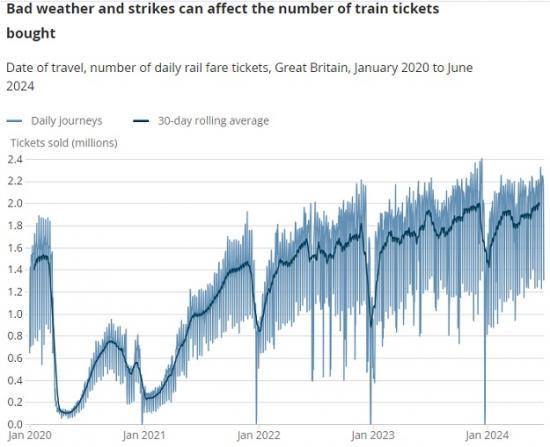Train Tickets - Understanding Spending Habits
7th August 2024

New data shows the effect of strikes on train ticket sales, and the most popular second-hand cars in Great Britain.
From scanners at supermarket tills to ticket offices at railway stations, new data on everyday costs are improving our understanding of how prices are changing over time.
It is crucial to measure price changes as precisely as possible, because accurate measures of inflation are playing an increasingly vital role in business, government, and everyday life.
We are working with several new data sources to produce improved and more detailed inflation data. These include:
Transactional data on rail fares from Rail Delivery Group.
Web-provided data on second-hand cars from Auto Trader
Microdata level rental data
Grocery retail scanner data
Data from these sources (including 40 million monthly rail fares transactions from Rail Delivery Group and 300,000 monthly second-hand car sales from Auto Trader) have already improved our Consumer price statistics.
We have been working with several grocery retailers to gather scanner data, covering approximately 50% of the UK grocery market share. We hope to introduce this to our Consumer price statistics from March 2025.
Meanwhile, our transformed private rental data provide greater detail in rental statistics and are more responsive to market changes.
As well as providing information on prices, these alternative data sources contain a wealth of other insights, including expenditure data.
Rail ticket sales drop during strikes and storms
We now have access to millions of rail fare transactions in Great Britain dating back to January 2019, from the rail industry's Rail Delivery Group. Before March 2023 we collected one data point per year, while we now use around 40 million per month (in a typical year).
From these daily transactions we can see the effect of major events on the number of rail tickets sold.
The number of daily tickets sold was far lower during the period of restricted movement during the coronavirus (COVID-19) pandemic, as well as on Christmas Day.
Strikes or extreme weather also affected the number of train tickets sold.
On Thursday, 20 July and Saturday, 22 July 2023, the Associated Society of Locomotive Engineers and Firemen and National Union of Rail (ASLEF) and Maritime and Transport Workers (RMT) unions were on strike. This resulted in a drop of tickets sold on these days by 50% and 44% compared with the same days the week before.
On the day of Storm Eunice, Friday, 18 February, 2022, there was a 54% fall in the number of train tickets sold, from 1,576,215 on the same day the week before to 720,070.
These data are extremely detailed, including information on where people travel from and to, ticket class, ticket type and price. Using destination stations, we can see the impact large events have on passenger numbers at nearby stations.
In the week of Glastonbury Festival in 2023, ticket sales shot up at Castle Cary, the nearest station to the event. In the week of 18 June 2023, there was a 663% increase in tickets sold, when compared with the average sold across 2023 excluding Glastonbury Festival.
The nearest station to Glastonbury festival saw a 654% increase in tickets sold in the week of Glastonbury 2023.
Percentage change of weekly rail fare tickets where the destination station was Castle Cary, Edinburgh Waverley or Abergavenny, compared to the median over the year for each station, Great Britain, January 2023 to December 2023.
The effect of Glastonbury Festival on local rail sales was far larger compared with ticket sales data from stations near other festivals.
At Edinburgh Waverley Station, ticket sales increased by 71% in the week of 6 August 2023, the first full week of the Edinburgh Fringe Festival.
Meanwhile, at Abergavenny, the closest railway station to the Green Man Festival, ticket sales increased by 104% on average in the week of 13 August 2023.
Readthe full ONS article HERE
